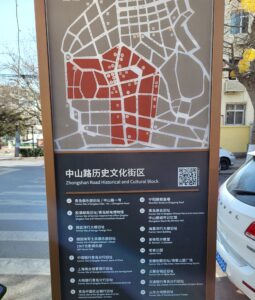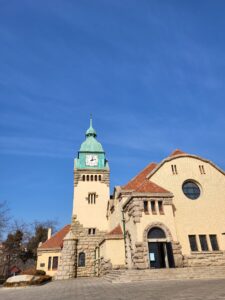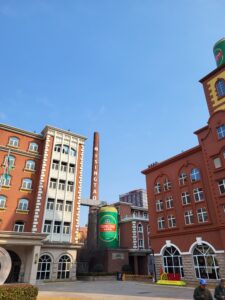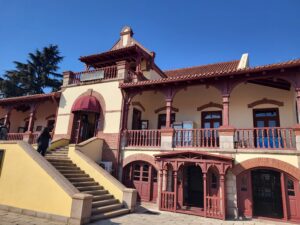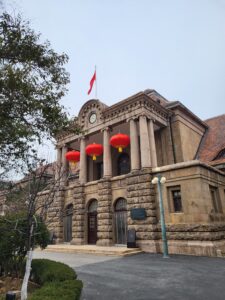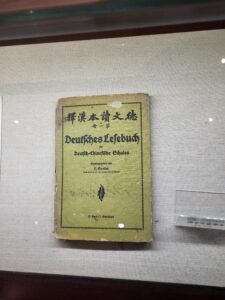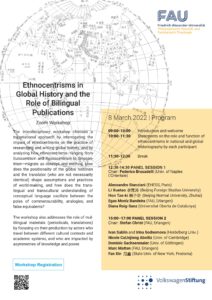Workshops and Chinese Global History Lab@FAU
The Chinese Global History Lab@FAU 2025 was the first one to take place outside of Germany. Together with Simone Derix and Marc Andre Matten, eight PhD candidates from universities in Germany and Switzerland conducted visits to historical sites, museums, and archives in Qingdao, Jinan and Beijing. The field trip was complemented by a symposium at the School of History at Beijing Foreign Studies University discussing transnational connections between China and Europe, an opportunity for the participants to present their work on the global history of China.
Impressions:
|
|
|
|
|
|
|
|
Symposium at Beijing Foreign Studies University:
Knowledge Flows between East and West
| Section One: Knowledge Transfer and the History of Studying Abroad | |
| Andreas Weis (Univ. Göttingen) | Sojourners Between China and Germany After the 1911 Revolution and the Intellectual Worlds They Created |
| Zhang Xueyan (Beijing Foreign Studies University) | Prussian Military Thought in Late Qing China: Institutional Adaptation and Structural Constraints in Zhang Zhidong’s Military Reform |
| Quentin Gagne (Beijing Foreign Studies University) | La province chinoise du Yün-nan (1879-1880) – Knowledge Transfer and the Formation of the French Colonial Imagination |
| Xia Ruifang (Beijing Foreign Studies University) | The Formation of Yao Kuo Kun’s Intellectual Genealogy and Academic Lineage – Based on the Archival Materials of the Program at the University of Heidelberg |
| Hu Kun (Beijing Foreign Studies University) | The Formation of Tao Yun-Kui’s Academic Lineage——An Examination Based on Tao Yun-kui’s Doctoral Dissertation and Related Archives in HU Berlin |
| Section Two: Transnational Historical Studies | |
| Li Aijing (Ruhr-University Bochum) | What is (not) being told? Narratives in the Museum of the Former German Prison in Qingdao |
| Niklaus Remund (University of Zürich) | Sino-Swiss Entanglements: Swiss Companies in China since the Reform Policy in 1978 |
| Zhang Qi (Ruhr-University Bochum) | Exploring Soviet History. Multi-Country Archival Research and Alternative Source Strategies |
| Li Lili (University of Munich) | Zeitlichkeit und Räumlichkeit in der Geschichtsschreibung internationaler Beziehungen |
| Julia Lange (University of Munich) | From China to Spain: Anarchist Global Culture in the Early Twentieth Century |
| Section Three: Intercultural Interaction in History | |
| Wang Shangshang (University of Munich) | Evolutionary Imaginations and Refractions in Late Qing and early Republican China |
| Li Zewei (Beijing Foreign Studies University) | A Cultural History Study of the Week System in China in the 19th Century: Focusing on the Education System Reform in the Late Qing Dynasty |
| Pan Ziqing (Chongqing University) | From De Bello Tartarico Historia to The Conquest of China by the Tartars: Imaginations and Metamorphoses of China in 17th-Century British Literature |
| Chen Yaling (Chongqing University) | From “Mitsein” to “zusammenleben”: On the Limitations of Heidegger’s Interpretation of Zhuangzi’s “Joy of the Fish” |
| Wang Ziyi (Renmin University) | The Tradition of Spiritual Discipline and the Generation of the Ershiwuyan: Matteo Ricci as a Humanist Missionary |
| Section 4: Intellectual History | |
| Weng Haifeng (Göttingen Univ.) | Confucianizing Bergson: The Knowledge Genealogy of He Lin’s Concept of “Supra-spacetime” in the Challenge of Linear Time |
| Chen Meng (Beijing Foreign Studies University) | Confucianism and the Construction of Wolff’s Ethical Thought |
| Wu Wenqiang (Chongqing University) | Historicity and Transcendence: A Comparative Study of Nietzsche and Husserl |
| Liu Chunyuan (Chongqing University) | The Historical Influence and Modern Significance of Chinese Ritual Studies |
| Closing Discussion | |
| Simone Derix
Marc Andre Matten |
|
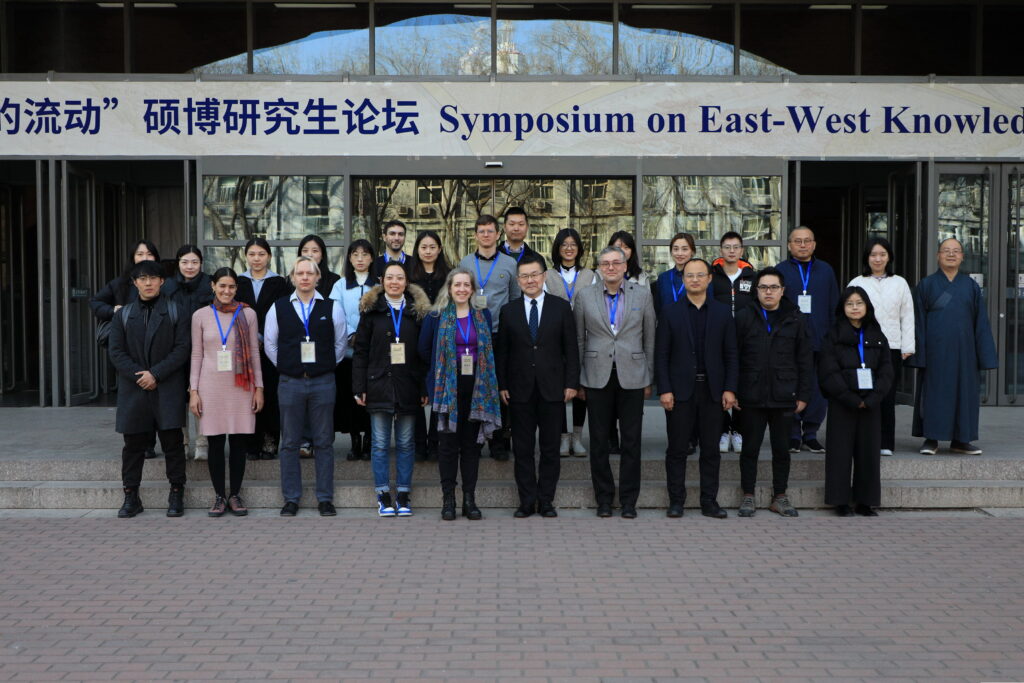
The topic of the Chinese Global History Lab@FAU 2024 focuses on questions of global knowledge transfer, translation practices, and transnational entanglements between China, Europe, Southeast Asia, and Japan. The topic of the 2024 Chinese Global History Lab@FAU is Multiperspectivity in Global History—Challenges and Chances. In conjunction with the Fifth Eurasian Doctoral Colloquium it is in cooperation with the University of Bonn, University of Göttingen, Kyungsung University (Korea), Kansai University (Japan), Beijing Foreign Studies University, and Zhejiang Gongshang University (both China). It offers PhD candidates to present their research to their peers and international researchers. Students will have the opportunity to receive feedback on their research topic and their methodology, as well as to interact with global historians and discuss new perspectives.
Mentors in the 2024 Chinese Global History Lab@FAU will be Marc Andre Matten, Henrike Rudolph, Egas Moniz Bandeira, Shen Guowei, Rui Kunze, and Kevin Bockholt.
全球史實驗室@FAU 2024: 全球史的多視角-挑戰與機遇
全球史實驗室@FAU 2024由大眾汽車基金會資助,專注於全球知識轉移、翻譯實踐以及中國、歐洲、東南亞和日本之間的跨國交叉等問題。2024 中國全球史實驗室@FAU 的主題是全球史中的多視角-挑戰與機會。
與波恩大學、哥廷根大學、경성대학교、關西大學、北京外國語大學和浙江工商大學合作舉辦,全球史實驗室@FAU 2024提供博士生向同儕和國際研究人員發表研究成果的機會。學生將有機會就其研究主題及其方法獲得回饋,並與全球歷史學家互動、討論新的觀點。
Dates: Oct. 11-12th, 2024.
Each panel consists of 20 min presentation, 15 min feedback by mentor and 25 min group discussion for each paper.
Friday 11th October 2024
| 9:15-10h | Welcome&Introduction by Marc Andre Matten | Room 00.3 |
| 10-12h | Session 1 | |
| Mentor: Egas Moniz Bandeira | Panel 1a
|
Room 00.3 |
| Mentor: Marc Andre Matten | Panel 1b
|
Room 00.4 |
| 12-13:30h | Lunch | Room 00.14 |
| 13:30-15:30h | Session 2 | |
| Mentor: Shen Guowei | Panel 2a
|
Room 00.3 |
| Mentor: Henrike Rudolph | Panel 2b
|
Room 00.4 |
| 15:30-16h | Coffee Break | Room 00.14 |
| 16-17:30h | City Tour |
Saturday 12th October 2024
| 9-10h | Keynote Marc Andre Matten | Room 00.3 |
| 10-12h | Session 3 | |
| Mentor: Rui Kunze | Panel 3a
|
Room 00.3 |
| Mentor: Egas Moniz Bandeira | Panel 3b
|
Room 00.4 |
| 12-13:30h | Lunch | Room 00.14 |
| 13:30-15:30h | Session 4 | |
| Mentor: Kevin Bockholt | Panel 4a
|
Room 00.3 |
| Mentor: Egas Moniz Bandeira | Panel 4b
|
Room 00.4 |
| 15:30-16h | Coffee Break | Room 00.14 |
| 16-17h | Concluding Discussion and Future Plans | Room 00.3 |
| 18h | Dinner at the Restaurant Thalermühle |
Sunday 13th October 2024
| 10:30-12h | Guided Tour through Germanisches Nationalmuseum in Nuremberg |
International Workshop and Call for Contributions to an edited book
Genghis Khan’s Posthumous Life in Modern Eurasia
Organized by Fei Chen, Marc A. Matten and Egas Moniz Bandeira
Genghis Khan built the largest land empire that history has ever seen, one that, at its peak, ruled over a quarter of the entire population in the known world and stretched from the Pacific Ocean in the east to the Danube River and the shores of the Persian Gulf in the west, from Siberia in the north to Himalayas and Indochina in the south. The military expansion of the Mongol Empire instilled both fear and awe of its founder in the minds of people across Eurasia and beyond, which makes him a global figure whose impact can still be felt today.
He is worshipped as a national hero in both China and Mongolia, as the equestrian statue at the bank of the Tuul River that has become a destination for tourists from both countries indicates. Narratives about him are often contested, and there are fierce controversies about whether he was a Chinese or Mongolian ruler. In 2020, the CCP criticized a museum in Nantes for not conveying the “correct” interpretation of his life and achievements.
The workshop will not only examine the discourses on Genghis Khan in academic studies and history textbooks but also investigate government policies that promote or ban the commemoration of this historical figure, asking whether he can serve as a shared hero. It will address the representations of this empire-builder in TV dramas, films, comics, and anime in countries and cultures ranging from Japan, Korea and China to Russia, Europe and India.
The goal of the workshop and the book project is to discuss the global dimension of Genghis Khan, asking where to situate him in the context of empires and nation-states. It aims to assess his historical significance for national, cultural, and ethnic discourses in the past and the present, how popular and official narratives impact each other, and which role sentiments of nostalgia, horror, and pride are employed at the intersection of history, politics, and popular culture.
We welcome contributions from scholars in various disciplines, including but not limited to history, Asian studies, political science, cultural studies, literature, and media studies.
The workshop is part of the project Writing History with China supported by the Volkswagen Foundation. It will take place (in person) at FAU Erlangen-Nürnberg from 8-10 March 2024.
Yi/chang 異/常—Ab-/Normalität in China
DVCS XXXIV, Erlangen 24.-26.11.2023
Normalität ist keineswegs „normal“. Sie ist weder natürlich noch gegeben, sondern sozial und kulturell konstruiert – ebenso wie ihr Pendant, das Abnormale (oder das „Pathologische“, so Georges Canguilhem). Zugleich ist der Begriff des Normalen seit jeher einem ständigen Prozess historischen Wandels unterzogen – seine Konzeption reicht von einer moralisch geladenen und ästhetisch reinen Vorstellung des „Idealen“ bis hin zu statistischen Abgrenzungen zwischen Normalität und Abnormalität.
In China hat die Dichotomie zwischen yi 異 und chang 常 (sowie verwandten Begrifflichkeiten) eine lange Geschichte, sei es in Hinblick auf Herrschaft, Recht, Philosophie, Religion, Medizin oder Fragen nach dem Ästhetischen in Literatur und Kunst. Die Etablierung, Wahrung und Abweichung von Normen und Standards, oder die Schaffung oder Deklaration einer „neuen Normalität“ (Paul Sailer-Wlasits) hat nicht nur in Zeiten der Krise eine entscheidende Rolle gespielt: Wo wurden im chinesischen Kulturraum die Grenzen zwischen dem Normalen und dem Abnormalen in Vergangenheit und Gegenwart gezogen? Wie wurde das Normale und Abnormale repräsentiert, idealisiert, aber auch umgangen? Welche kulturellen, sozialen, politischen, wissenschaftlichen und religiösen Faktoren haben Konstruktion und Dekonstruktion des Normalen im Lauf der chinesischen Geschichte geprägt?
Die Problematik des Normalen und Abnormalen ist dabei nicht auf den typischen Untersuchungsraum der Sinologie beschränkt. Regionale und transnationale Austauschprozesse stellen die Definition von und die Auseinandersetzung mit Normalität vor globale Herausforderungen. Gibt es Normalitäten oder Abnormalitäten mit „chinesischen Charakteristika“? Welche Normen wurden und werden als universal verstanden, und welche als kulturell oder politisch spezifisch? Auf einer anderen Ebene stellt sich der Sinologie auch die Frage, wie wir mit umfassenden Konzepten der Normalität im Dialog mit und über China umgehen sollen.
Auf der diesjährigen Tagung der DVCS an der Friedrich-Alexander-Universität Erlangen-Nürnberg vom 24. bis zum 26. November 2023 möchten wir der Frage nach „Normalität“ aus unterschiedlichen sinologischen Perspektiven nachgehen. Beiträge zu verschiedenen Themenfeldern sind herzlich willkommen, so zum Beispiel zu den folgenden:
- Philosophische Diskurse zu Normen und Standards, bzw. zu Begriffen wie yi 異 und chang 常
- Universalismus und Partikularismus
- Quantitative Definitionen von Normalität in China (in Medizin, Psychologie und Anthropologie)
- Institutionen der Normierung und Standardisierung von Maßen, Gewichten und Schrift
- Globale Normen, universelle Rechte und ihre Herausforderungen (Menschenrechte, akademische Freiheit, etc.)
- Durchsetzung von Normen und Standards im Kontext von Kontrolle und Herrschaft
- Soziale Normen und Rituale in Vergangenheit und Gegenwart
- Freiräume zur Abgrenzung vom gesellschaftlichen/politischen Mainstream in China
- „Chinesische Charakteristika“ (Zhongguo tese 中国特色)
- Gendernormen und Geschlechterrollen in China
- Literarische Repräsentationen des Normalen und Andersartigen
- „Mainstream“ und Subkulturen in Kunst, Literatur und Film
How to make China part of Global History Research?
Spring School at FAU Erlangen-Nürnberg
7-10 March 2023
In March 2023 the first spring school in Chinese global history at the Friedrich-Alexander-Universität Erlangen-Nürnberg (FAU) in Germany took place. Ph.D. candidates and advanced master students from Europe, East Asia, and North America presented their projects and discussed how to make Chinese history part of global and/or transnational history research.
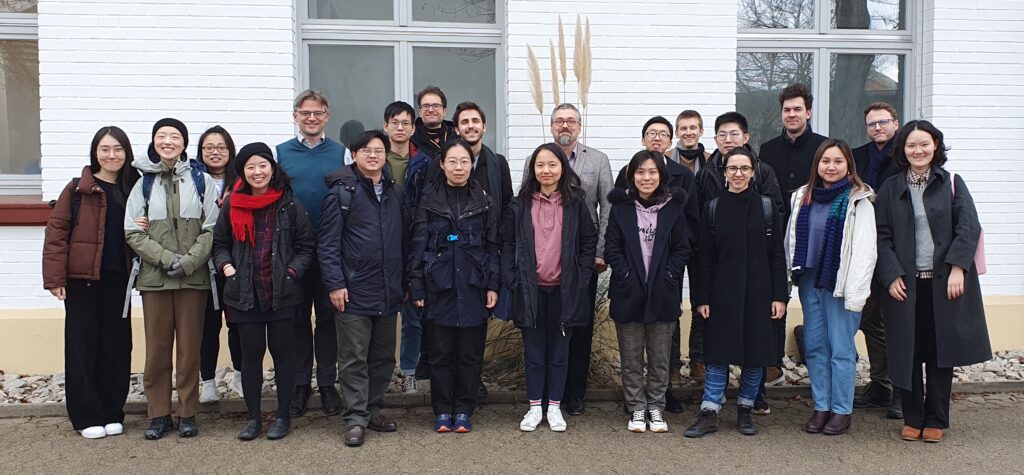
In recent years Chinese historians have started to join the non-Chinese academic community by increasingly publishing their findings in Western languages. The discussion of their results, however, is still largely limited to the field of Chinese studies and/or sinology. The workshop investigated the conditions and limits of integrating Chinese methods and theories of global/transnational history into our research. What do the translations of Chinese texts tell us about soft power in academia, and how can they help us to question the persisting Eurocentrism in historical sciences? How to pursue interdisciplinary research that combines Chinese studies and historical sciences? How to situate one’s own research in global and/or transnational history?
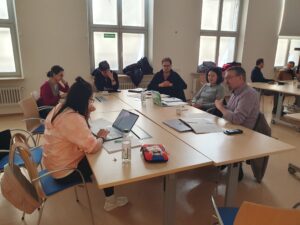
This spring school offered a program for Ph.D. candidates and advanced master students interested in the global history of/in China. We read translations of Chinese and Taiwanese historians, introduced digital archives and databases, and offered an opportunity to the participants for sharing and discussing their texts and manuscripts in small groups. Modules 1+2 consisted of a short introduction, specific examples, and research questions, as well as small group discussions on problems and challenges in the participants’ own research. The workshop included two sessions on thesis writing where participants could present and discuss their own texts.
Program
7 March
- 9-10h Introduction to the spring school: Marc Matten, Egas Moniz Bandeira (FAU) and Fan Xin (Cambridge University)
- 10-12h Presentation of Ph.D. research topics
- 13-16h Module 1: Chinese Models of Global History. Discussion of Wang Lihua 王利华: “Scientific Name · Principles · Framework—A Reflection on the Academic Principles of Environmental History with Chinese Characteristics” 学名·义理·骨架“—中国特色环境史学理思考之一, Shehui kexue zhanxian 9 (2019).
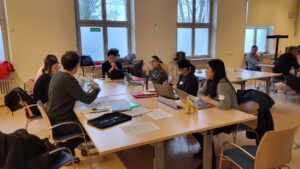
8 March
- 9-12h Module 1: Chinese Models of Global History. Discussion of Liu Qing 刘擎: “Reimagining the Global: From the Ideal of Tianxia to New Cosmopolitanism” 重建全球想象: 从“天下”理想走向新世界主义, Xueshu yuebao, 47/8 (2015).
- 13-16h Thesis Writing Workshop 1 for each Group (1-4)
9 March
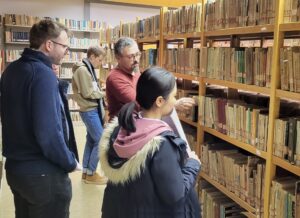
- 9-12h Module 2: Methodological challenges: Archives, digital resources, and censorship in
historical research on China - 14-17h Visit of SASS Collection at FAU (sass.fau.de)
10 March
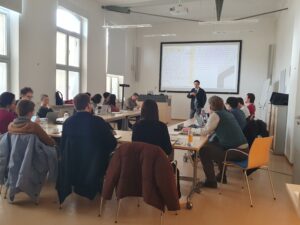
- 9-10h Keynote: The Return of Chen Ching Lin: How to Write a Global Microhistory of China, by Prof. Cao Yin, Associate Professor and Cyrus Tang Scholar in the Department of History, Tsinghua University
- 10-12h Thesis Writing Workshop 2 for each Group (1-4)
- 13-15h General discussion
Group 1: Global History of Science, Medicine, and Anthropology
| Liu Qieyi | University of Toronto | Enlivening Ten Thousand Things: The Culture of Natural Sciences in Modern China, 1900-1960 |
| Chen Po-Hsun | University of Manchester, UK | Negotiating Herbal Toxicity for Modern Imaginaries of Diasporic Chinese Countries: Controversies of Herbal Toxicities in Taiwan and Singapore after World War II |
| Gao Shanshan | City University of Hong Kong | The Basic Theory of Chinese Medicine in Socialist China: A Textbook-Based Research |
| Lisa Zhang | Universität Heidelberg | Re-thinking Indian Philosophy in Early Twentieth Century China |
Group 2: Global Socialism
| Liang Yue | Binghamton University, NY | The 1954 Yangzi River Flood and China’s Diplomacy in the mid-1950s |
| Hu Yawen | Universität Heidelberg | A Socialist Transcultural Space: The Soviet Model and Mao’s New World |
| Karina Khasnulina | Universität Leipzig | Transferring the Soviet Model: Global Socialism and Industrial Localities in Early Maoist China |
| Sebas Rümke | Vrije Universiteit Amsterdam | Chinese Perspectives of World and Global History from the 19th to the 21st century |
| Sun Weihan | University of Oxford | “Strengthen Socialist Legality”: Wavering Line and Understanding Towards the Institutionalization of Judicial Organs |
Group 3: Cultural Transfers in a Global Perspective
| Phoebe Ka Laam Ng | FU Berlin & Humboldt-Universität zu Berlin | The Two Macau Museums in Lisbon and Macau SAR: Examining Historical Narratives Represented in Museum Space from the Global History Aspect |
| Hu Yi-fan | Aix-Marseille University | Intellectual Communities and Global Networks in Modern China |
| Sun Meng | Universität Heidelberg | Global Maze of Ideas: The Social Life of Coffee in China, 1844-1949 |
| Zhao Xiaoyang | Georg-August-Universität Göttingen | Global and Local Dynamics of Fountain Pens in Shanghai: Indigenization, Marketization and Consumption, 1872-1949 |
| Rubén Jesús Almendros Peñaranda | Inalco, Paris | Portrait of Decadence: Foreign Presence and the End of the Dynastic World in Nineteenth Century Chinese Fiction |
Group 4: War, Conflict and Asymmetries
| Ka Shing So | Binghamton University, NY | Hong Kong in the Global Cold War: Smuggling and Cooperation During Korean War 1951-1953 |
| Kevin Bockholt | Universität Hamburg | The First World War from the Chinese perspective |
| Jonas Schmid | Universität Heidelberg | Knowledge Asymmetries in Textbooks: The Representation of the Macartney Mission in Current German History Textbooks |
| Sebestyén Hompot | Univ. of Vienna | Mainland Chinese Historiography in Search of National and Global Identities: A Discourse Analysis of Recent Historiography on the Zheng He Maritime Missions (1405–1433 CE) |
Ethnocentrisms in Global History and the Role of Bilingual Publications
Date: 8 March 2022
Registration via Email.
Since its emergence as a new approach in writing history, global history has focused on the question of how to overcome Eurocentrism by no longer privileging one center over another periphery. The rise and fall of area studies and the continuous critique of methodological nationalism notwithstanding, various ethnocentrisms outside of Europe and North America, ranging from Afrocentrism and Islamocentrism to Sinocentrism, continue to shape the debate of how to understand global history.
This interdisciplinary workshop chooses a transnational approach by interrogating the impact of ethnocentrisms on the practice of researching and writing global history, to analyze how ethnocentrisms migrate and how they are translated as concepts and method. How does the positionality of the global historian and the translator (who are not necessarily identical) shape assumptions and practices of world-making, and how the translingual and transcultural understanding of concepts oscillates between the poles of commensurability, analogies, and false equivalents?
The workshop also addresses the role of multilingual materials (periodicals, translations) by focusing on their production by translators and mediators who travel between different cultural contexts and academic systems, and who are impacted by asymmetries of knowledge and power.
Possible questions for the workshop are:
- How do transnational historians who read and write in more than one language and who are members of more than one academic community discuss Eurocentrism and its varieties in their work?
- In what ways does the need for accommodating different languages, conceptual terms, and conflicting narratives limit or expand the potential of global history? Under what circumstances do global historians consider analytical concepts and theories on culture, politics, and society no longer transferable from one culture to another, but as epistemic violence?
- How do translators and cultural brokers situate themselves in this position, and how does this impact their actual work that takes place in-between the center and the periphery?
- Is a global history possible without references to ethnocentrism? If yes, what could a non-centric way of writing history look like?
Each panel starts with a short introduction (2-3 min) of a historical source, literary source, or archival document that each participant considers representative of the questions listed above. Copies of these texts will be distributed prior to the workshop (the texts do not need to be necessarily in English, translations and/or summaries in English will be provided).
Please register via Email.
Workshop: „Chinesische Positionen zur Verfassungs- und Völkerrechtsgeschichte“
(23. Juni 2022)
zusammen mit Lucas Brang (Universität Köln)
(auf Englisch)
Zur Vorbereitung dienen die beiden folgenden Texte:
Xu Jilin 许纪霖. 革命后的第二天——中国“魏玛时期”的思想与政治(1912~1927)(The Day after the Revolution of 1911:A Study on the Thoughts and Politics during the “Weimar Period” in Modern China,1912-1927). In: Kaifang shidai, 3/2000, S. 68-93.
Zhang Yongle 张永乐. Ci jiang er jie. Menluo zhuyi yu jindai kongjian zhengzhi 此疆尔界—门罗主义与近代空间政治 (Shifting Boundaries — A Global History of the Monroe Doctrine). Beijing: Sanlian shudian, Vorwort.
(zu finden in der FAU-Box)
Ablauf:
14 – 17 Uhr: Workshop in der Bibliothek der VW-Sammlung (D1 Flügel, Hartmannstr. 14, 91052 Erlangen; Parkplätze sind vorhanden)
